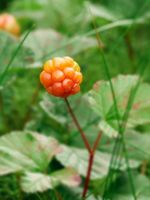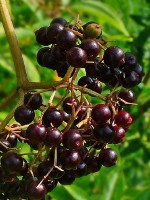Mon-Fri 9am - 5pm Mountain time
Cloudberry vs Ranch Elderberry
Rubus chamaemorus
Sambucus canadensis Ranch
NOT AVAILABLE THIS SEASON - MIGHT RETURN
NOT AVAILABLE THIS SEASON - MIGHT RETURN
Cloudberry produces berries which taste tart and tangy with a sweet, floral hint. The berries have a creamy texture when overripe. They are often used to make jams, juices, and liquors. The berries are a pale red colour and when ripe turn more orange/amber. They do not grow very tall, generally reaching only 10-25 cm.
Cloudberry has distinct male and female plants. In order to produce berries, both must be present and pollinate with each other. Berries are produced at maturity, typically 5-7 years, and produce 1 berry per stem. The plant spreads naturally as they grow using modified underground stems (rhizomes), forming more plants over time in the same area.
This plant can be found wild in Canada’s boreal forest. In Newfoundland and Labrador, this plant is known as the Bakeapple and is a significant regional food. Similarly the Côte-Nord region of Quebec also has a long history of using this berry.
Note: Cloudberries require very specific soil conditions. They need well-drained soil with a pH between 3.5 and 5.0. Also sensitive to salt and dry conditions.
Note: Our seedlings are grown from seed and are too young to identify their sex.
Ranch Elderberry is a vigorous and high-yielding Black Elderberry cultivar. It ripens earlier than other varieties and is smaller and more compact making berry harvest easier. The berries are well-suited for baked goods, jams, jellies, and syrups. They are high in vitamin C and reported to be beneficial for the immune system.
Black Elderberries are considered to be partially self-pollinating. So while they will still produce some berries without cross-pollination, planting with another variety will increase yields. Consider planting with Black Elderberry or Bob Gordon Elderberry.
Warning: the seeds, stems, leaves, roots, and uncooked berries are toxic to humans when eaten in quantity. Berries should be cooked to make them safe for human consumption.
Cloudberry Quick Facts
Ranch Elderberry Quick Facts
Toxicity: leaves, stems, and uncooked berries are poisonous to humans

